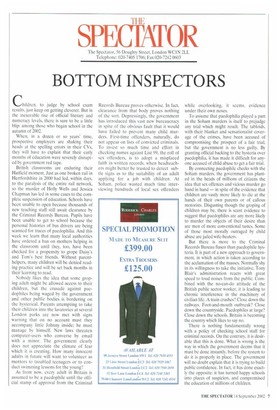BOTTOM INSPECTORS
Children, to judge by school exam results, just keep on getting cleverer. But in the inexorable rise of official literary and numeracy levels, there is sure to be a little blip: among those who began school in the autumn of 2002.
When, in a dozen or so years' time, prospective employers are shaking their heads at the spelling errors in their CVs, they will have to explain that their early months of education were severely disrupted by government red tape.
British classrooms are enduring their Hatfield moment. Just as one broken rail in Hertfordshire in 2000 had led, within days, to the paralysis of the entire rail network, so the murder of Holly Wells and Jessica Chapman has led in some cases to the complete suspension of education. Schools have been unable to open because thousands of new teaching staff still await clearance by the Criminal Records Bureau. Pupils have been unable to get to school because the personal histories of bus drivers are being scanned for traces of paedophilia. And this week we learn that many local authorities have ordered a ban on mothers helping in the classroom until they, too, have been checked for a propensity to grope Daisy's and Tom's best friends. Without parenthelpers, many children will be denied reading practice and will be set back months in their learning to read.
Nobody likes the idea that some groping adult might be allowed access to their children, but the crusade against paedophiles being waged by the government and other public bodies is bordering on the hysterical. Parents attempting to take their children into the lavatories at several London parks are now met with signs warning that on no account must they accompany little Johnny inside; he must manage by himself. New laws threaten computer-users who converse by email with a minor. The government clearly does not appreciate the climate of fear which it is creating. How many innocent adults in future will want to volunteer as mentors to troubled teenagers or to conduct swimming lessons for the young?
As from now, every adult in Britain is assumed to be a paedophile until the official stamp of approval from the Criminal Records Bureau proves otherwise. In fact, clearance from that body proves nothing of the sort. Depressingly, the government has introduced this vast new bureaucracy in spite of the obvious fault that it would have failed to prevent many child murders. First-time offenders, naturally, do not appear on lists of convicted criminals. To invest so much time and effort in checking names against List 99, the roll of sex offenders, is to adopt a misplaced faith in written records, when headteachers might better be trusted to detect subtle signs as to the suitability of an adult applying for a job with children. At Soham. police wasted much time interviewing hundreds of local sex offenders while overlooking, it seems, evidence under their own noses.
To assume that paedophilia played a part in the Soham murders is itself to prejudge any trial which might result. The tabloids, with their blanket and sensationalist coverage of the crimes, have been accused of compromising the prospect of a fair trial, but the government is no less guilty. By granting official backing to the hysteria over paedophilia, it has made it difficult for anyone accused of child abuse to get a fair trial.
By connecting paedophile checks with the Soham murders, the government has planted in the heads of millions of citizens the idea that sex offences and vicious murder go hand in hand — in spite of the evidence that children are vastly more likely to die at the hands of their own parents or of callous motorists. Disgusting though the groping of children may be, there is scant evidence to suggest that paedophiles are any more likely to murder the objects of their desire than are men of more conventional tastes. Some of those most morally outraged by child abuse are jailed wife-beaters.
But there is more to the Criminal Records Bureau fiasco than paedophile hysteria. It is part of a new approach to government, in which action is taken according to the acclamation of the masses. Normally shy in its willingness to take the initiative. Tony Blair's administration reacts with great speed to loud noises from the public. Combined with the no-can-do attitude of the British public sector worker, it is leading to chronic interference in the machinery of civilian life. A train crashes? Close down the railways. Foot-and-mouth outbreak? Close down the countryside. Paedophiles at large? Close down the schools. Britain is becoming the country which likes to say no.
There is nothing fundamentally wrong with a policy of checking school staff for criminal records. On the contrary, it is desirable that this is done. What is wrong is the way in which the government deems that it must be done instantly, before the system to do it is properly in place. The government will no doubt explain that it is trying to build public confidence. In fact, it has done exactly the opposite: it has turned happy schools into places of suspicion, and compromised the education of millions of children.










































































 Previous page
Previous page